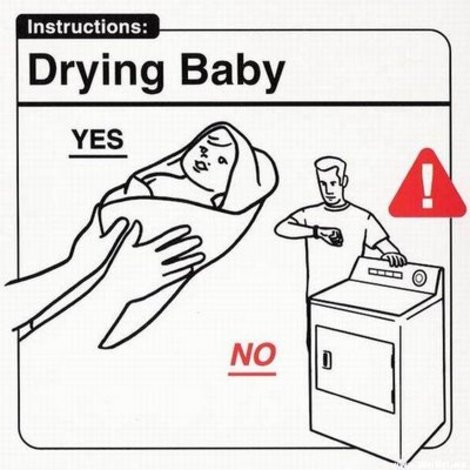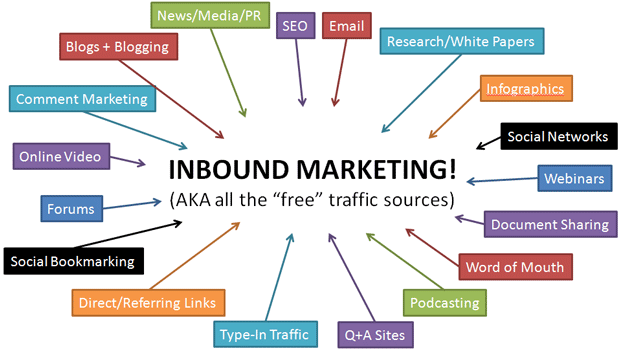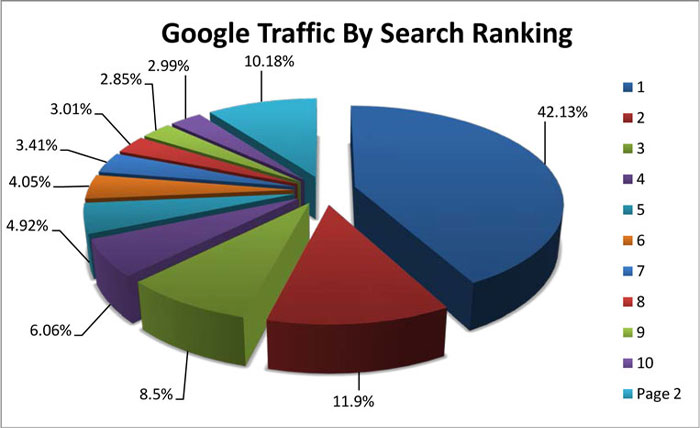The Myth of Fair and Balanced Media, and How it has Dumbed Down the Populace



WordPress database error: [Table 'sicksens_wp221.wp_categorymeta' doesn't exist]SELECT category_id, meta_key, meta_value FROM wp_categorymeta WHERE category_id IN (393) ORDER BY meta_id ASC



 Instead of trying to rank for random and "got lucky" terms, or trying to convert those who arrived at your site while looking for something your don't actually provide, your site team should be planning specific Inbound Marketing terms to use in your Search Traffic Strategy (STS).
Instead of trying to rank for random and "got lucky" terms, or trying to convert those who arrived at your site while looking for something your don't actually provide, your site team should be planning specific Inbound Marketing terms to use in your Search Traffic Strategy (STS).  Your STS strategy should culminate with one specific goal: converting visitors to your site's primary purpose. If you have an ecommerce site, then the your strategy should focus on targeted traffic likely to desire your products. The same holds true for services, content, blogs or any other type of site you are trying to deliver qualified search traffic to.
There are many blogs offering "Top 5 Search Strategy", or "6 Search Traffic Items You Can't Ignore", and any other spammy title of the like, but these are more for promoting that SEO Company's blog than to assist you in your goals. Instead, we are going to simply list a couple of common sense solutions to amplify your Search Traffic Strategy and boost your converted inbound marketing. You'll find tons of blogs pushing strategies like the image below, but effectively, throwing all the crap at the wall and hoping it sticks isn't a strategy for anything but mayhem.
Your STS strategy should culminate with one specific goal: converting visitors to your site's primary purpose. If you have an ecommerce site, then the your strategy should focus on targeted traffic likely to desire your products. The same holds true for services, content, blogs or any other type of site you are trying to deliver qualified search traffic to.
There are many blogs offering "Top 5 Search Strategy", or "6 Search Traffic Items You Can't Ignore", and any other spammy title of the like, but these are more for promoting that SEO Company's blog than to assist you in your goals. Instead, we are going to simply list a couple of common sense solutions to amplify your Search Traffic Strategy and boost your converted inbound marketing. You'll find tons of blogs pushing strategies like the image below, but effectively, throwing all the crap at the wall and hoping it sticks isn't a strategy for anything but mayhem.
 Instead, make a decisive list of keywords to track, and pay little, if any attention to the others without traffic data to legitimize them as useful terms. You will want to ensure that your keywords are ones that convert traffic and sales, and as a result, this will be a criteria needing regular investigation. Again, this is where the scared SEO Tech will bring up ranking for random terms, but be mindful that these terms will need serious scrutiny. When adding additional terms to your watch list, ensure that they produce. Search new keywords in "Google Trends" to see if they have any ranking. This is especially true when you dig down to your local market. If you rank #1 for a term that gets 1 local search per month, then it might not be one worth nurturing.
If your SEO Expert tells you that this is a needed term, you may want to look for a more qualified representative. Ultimately, there will be new tools to pick up at every turn along the path, so most importantly, remain teachable. SEO and Search Traffic Strategy are fluid and will require updating methods to adapt to updated measures.
Instead, make a decisive list of keywords to track, and pay little, if any attention to the others without traffic data to legitimize them as useful terms. You will want to ensure that your keywords are ones that convert traffic and sales, and as a result, this will be a criteria needing regular investigation. Again, this is where the scared SEO Tech will bring up ranking for random terms, but be mindful that these terms will need serious scrutiny. When adding additional terms to your watch list, ensure that they produce. Search new keywords in "Google Trends" to see if they have any ranking. This is especially true when you dig down to your local market. If you rank #1 for a term that gets 1 local search per month, then it might not be one worth nurturing.
If your SEO Expert tells you that this is a needed term, you may want to look for a more qualified representative. Ultimately, there will be new tools to pick up at every turn along the path, so most importantly, remain teachable. SEO and Search Traffic Strategy are fluid and will require updating methods to adapt to updated measures. In the old days of Search Engine Marketing, and sometimes still true today, ad agencies would charge ridiculous amounts of money for ad driven traffic even when it had nothing to do with a site's content. Conversions were low and bounce rates were high. Today, the same is still occurring but now expanded to SEO campaigns. In Chicago it is far too common to find websites littered with footers pages for each individual township and suburb. At first, companies like Reach Local and Orange Soda did this as a way to push relevant content and lift their own clients in the SERPs. The problem was, these pages were comprised of the same city data, spun over and over, and leaving multiple sites with the same giant spam bomb in the footer and sitemap of each of their clients. Many freelance and smaller SEO Companies in Chicago followed this blueprint and littered the search results with more of the same. As a result, the practice became one of the basic principles to Chicago SEO tactics.
Poor overall traffic from high SEO placement is another problem. Imagine a keyword ranking at the #1 position but only delivering 50 visitors a month, and then a keyword that was ranking in the #6 position that was delivering 900 visitors a month - which one would you rather? Traffic numbers are much more valuable than rankings alone and converted traffic is the primary focus.
This cheap and semi-effective SEO and SERP placement method had a major downfall: when the sites received the positive listings resulting from all of the city data, they also received few visitors willing to trudge through the mounds of crap content to find what they were actually interested in. The basic remedy for this problem is the keystone for the framework of Search Optimized Traffic.
In the old days of Search Engine Marketing, and sometimes still true today, ad agencies would charge ridiculous amounts of money for ad driven traffic even when it had nothing to do with a site's content. Conversions were low and bounce rates were high. Today, the same is still occurring but now expanded to SEO campaigns. In Chicago it is far too common to find websites littered with footers pages for each individual township and suburb. At first, companies like Reach Local and Orange Soda did this as a way to push relevant content and lift their own clients in the SERPs. The problem was, these pages were comprised of the same city data, spun over and over, and leaving multiple sites with the same giant spam bomb in the footer and sitemap of each of their clients. Many freelance and smaller SEO Companies in Chicago followed this blueprint and littered the search results with more of the same. As a result, the practice became one of the basic principles to Chicago SEO tactics.
Poor overall traffic from high SEO placement is another problem. Imagine a keyword ranking at the #1 position but only delivering 50 visitors a month, and then a keyword that was ranking in the #6 position that was delivering 900 visitors a month - which one would you rather? Traffic numbers are much more valuable than rankings alone and converted traffic is the primary focus.
This cheap and semi-effective SEO and SERP placement method had a major downfall: when the sites received the positive listings resulting from all of the city data, they also received few visitors willing to trudge through the mounds of crap content to find what they were actually interested in. The basic remedy for this problem is the keystone for the framework of Search Optimized Traffic.

 The proliferation of the political scams is two fold; the first goal being to direct public opinion by preaching to a choir, the second being to drive traffic to sites filled with products aligned with the content itself. Many of the Natural News (and its affiliates site's) articles are solely produced to push traffic to their product affiliate sites for purchasing books or 'natural remedies". The traffic for survivalists will take them to sites promoting solar water heaters and wood-burning stoves (sold at ridiculously expensive prices at that). The scam site method is fairly simple, it only requires having a bunch of sheep ready to repost network stories for ad and clickbaited traffic. Often, most of the reproduction sites will be owned by the same group as the originating site.
The SEO methods used by reposting false information include medical info as well. In spite of medical science, the proliferation of false claims on medical needs is growing by the day. People, convinced in spite of science, that medical needs like vaccinations and treatments are some form of evil scam to make people sick (irony being that they avoiding the vaccines increases sickness) are increasingly promoting false narratives at the behest of their blogger overlords. Often, this information will be completely void of even the most basic scientific study. Again, Natural News is a notorious for the use of down-line blogging to perpetuate its SEO Content Countermeasures to recognized science. You may ask, "why would they do this to sell a few books?", and in doing so you will be asking a legitimate question. The answer is simple, they make millions off of affiliate book sales, vitamin sales, and training/event sales associated with the topics they push. In the end, the irony is that they claim the motivation for medical science to promote medical cures is money, while in the end, it is their own primary purpose. Obviously, Natural News and its many clone sites is an easy target, but it certainly isn't the only one. Often the hoax stories used on its network are dusted off months or years later to replicate the same affiliate gains. Even after pointed out to be the obvious lies they are, the dedicated who desire it to be true will promote the false stories without question.
Ultimately, public safety is put into jeopardy by these groups because of the purposeful direction of the public to act in a manner that is contrary to their health or basic common sense. Yes, the people who fall for and repromote this misinformation are guilty of being naive, gullible and ignorant, but those leading them by the snout are doing so in a way that is blatantly irresponsible and places large populations in danger... all to make a buck and push agendas.
Using SEO and Content Countermeasures to Hide Criminal and Legal Data
Someone will always be trying to invent a better mousetrap, but what happens when the mousetrap itself is under attack? People entrust their futures, businesses and family welfare to background and identity checks; what happens when the information gained from them is bogus? The answer is simple, the system fails those who deserve to know enough to protect themselves, their businesses and their families.
The proliferation of the political scams is two fold; the first goal being to direct public opinion by preaching to a choir, the second being to drive traffic to sites filled with products aligned with the content itself. Many of the Natural News (and its affiliates site's) articles are solely produced to push traffic to their product affiliate sites for purchasing books or 'natural remedies". The traffic for survivalists will take them to sites promoting solar water heaters and wood-burning stoves (sold at ridiculously expensive prices at that). The scam site method is fairly simple, it only requires having a bunch of sheep ready to repost network stories for ad and clickbaited traffic. Often, most of the reproduction sites will be owned by the same group as the originating site.
The SEO methods used by reposting false information include medical info as well. In spite of medical science, the proliferation of false claims on medical needs is growing by the day. People, convinced in spite of science, that medical needs like vaccinations and treatments are some form of evil scam to make people sick (irony being that they avoiding the vaccines increases sickness) are increasingly promoting false narratives at the behest of their blogger overlords. Often, this information will be completely void of even the most basic scientific study. Again, Natural News is a notorious for the use of down-line blogging to perpetuate its SEO Content Countermeasures to recognized science. You may ask, "why would they do this to sell a few books?", and in doing so you will be asking a legitimate question. The answer is simple, they make millions off of affiliate book sales, vitamin sales, and training/event sales associated with the topics they push. In the end, the irony is that they claim the motivation for medical science to promote medical cures is money, while in the end, it is their own primary purpose. Obviously, Natural News and its many clone sites is an easy target, but it certainly isn't the only one. Often the hoax stories used on its network are dusted off months or years later to replicate the same affiliate gains. Even after pointed out to be the obvious lies they are, the dedicated who desire it to be true will promote the false stories without question.
Ultimately, public safety is put into jeopardy by these groups because of the purposeful direction of the public to act in a manner that is contrary to their health or basic common sense. Yes, the people who fall for and repromote this misinformation are guilty of being naive, gullible and ignorant, but those leading them by the snout are doing so in a way that is blatantly irresponsible and places large populations in danger... all to make a buck and push agendas.
Using SEO and Content Countermeasures to Hide Criminal and Legal Data
Someone will always be trying to invent a better mousetrap, but what happens when the mousetrap itself is under attack? People entrust their futures, businesses and family welfare to background and identity checks; what happens when the information gained from them is bogus? The answer is simple, the system fails those who deserve to know enough to protect themselves, their businesses and their families.
 People of ill repute and those with a past worth hiding use SEO Countermeasures and Content Manipulation to promote a fictitious form of themselves so that their past, present and future victims are blind to the actual threats the individual can hold. We ran into a typical scammer recently who had an intricate manner of hiding reports of his previous scams. He produced so many member and blog accounts in his own name that even articles about his scams from Ripoff Report and NY Times were pushed to page 10.
Many are getting in on this option; from legal offenders to financial swindlers, the option allows them at least one more hustle and a crowd of people unable to find the sourced information about the scammer's history. The scammer mentioned above even went so far as to seek legal orders to force google to hide search results mentioning his name (since he apparently trademarked himself). As a result, attempts to find accurate information on this person who has scammed and stolen from so many are often in vain.
People of ill repute and those with a past worth hiding use SEO Countermeasures and Content Manipulation to promote a fictitious form of themselves so that their past, present and future victims are blind to the actual threats the individual can hold. We ran into a typical scammer recently who had an intricate manner of hiding reports of his previous scams. He produced so many member and blog accounts in his own name that even articles about his scams from Ripoff Report and NY Times were pushed to page 10.
Many are getting in on this option; from legal offenders to financial swindlers, the option allows them at least one more hustle and a crowd of people unable to find the sourced information about the scammer's history. The scammer mentioned above even went so far as to seek legal orders to force google to hide search results mentioning his name (since he apparently trademarked himself). As a result, attempts to find accurate information on this person who has scammed and stolen from so many are often in vain.
 The "push down" effect of Content Countermeasures and SEO Tactics used for these dishonest means are likely to persist. Google has given no indication that is has a real solution to counter the SEO Countermeasures being deployed. Google attempted to kill the duplicate content and spun material game, but only so much can be done when some of these scammers are running hundreds of accounts and sites to keep a clean image. They're wolves and their fake wool consists of the SEO Content and descriptors of themselves used to promote the false narrative.
We can hope that they will finally be curtailed, but they appear to be a constant from generation to generation. These are the same sad sacks that would be selling snake oil and 'miracle cures" in the 1800's. The unfortunate reality is that Content Countermeasures are only the latest tool of those who wish to defraud their fellows. That they have learned how to manipulate SEO techniques for these scams is only the latest step in a long walk. We can only assume that their growth online will continue, marking less honesty and more skepticism.
The "push down" effect of Content Countermeasures and SEO Tactics used for these dishonest means are likely to persist. Google has given no indication that is has a real solution to counter the SEO Countermeasures being deployed. Google attempted to kill the duplicate content and spun material game, but only so much can be done when some of these scammers are running hundreds of accounts and sites to keep a clean image. They're wolves and their fake wool consists of the SEO Content and descriptors of themselves used to promote the false narrative.
We can hope that they will finally be curtailed, but they appear to be a constant from generation to generation. These are the same sad sacks that would be selling snake oil and 'miracle cures" in the 1800's. The unfortunate reality is that Content Countermeasures are only the latest tool of those who wish to defraud their fellows. That they have learned how to manipulate SEO techniques for these scams is only the latest step in a long walk. We can only assume that their growth online will continue, marking less honesty and more skepticism.
The Authorship markup was first unveiled by Google in June 2011 and SEO Techs everywhere rejoiced. Its roots can be traced back to the company's Agent Rank patent of 2007. Bill Slawski, an expert on Google's patents, says that the Agent Rank patent is a type of system wherein multiple pieces of content are connected with a digital signature that represents one or more "agents" (authors).
Three years after Google Authorship was launched, the company decided to discontinue the project and SEO's everywhere cried a little. The announcement came from John Mueller of Google Webmaster Tools which he posted in Google+. According to Mueller, Google will stop displaying authorship in Google Search. Likewise, it will no longer track data from content with the rel=author markup in SERP rankings.
Google noticed that displaying the authorship information wasn't as useful as the company had thought it would be. At some point, it can even distract from the results. For these reasons, Google decided to axe the Authorship project.
Don't discount Author Rank as a result of this change and the reduced spinets.
Google divulged that dropping Google Authorship shouldn't have an impact on how the In-depth articles section works so strong writers' SEO platforms should be intact. Google also explained that the dropping of Google Authorship won’t impact its other efforts to reward authors who perpetually make quality and engaging content. Well, if you read the above portion, you're likely scratching your heads. How is there to be author rank without authorship, when Google has also said that it’s ignoring authorship markup? The answer is that Google has other ways to the author of a quality story, if it wants. In particular, Google is likely to look for visible "bylines" and citations that often appear on news stories and blog posts. These existed before Google Authorship, and they aren't going away. One thing to keep in mind, you will want to ensure that all of your titled work is consolidated under the account name you will want tracked.Author Rank Is Real — And Continues!
Schmidt was just speculating in his book, not describing anything that was actually happening at Google. From Google itself, there was talk several times last year of making use of Author Rank as a way to identify subject experts and somehow boost them in the search results:
- Google Authority Boost: Google’s Algorithm To Determine Which Site Is A Subject Authority, May 2013
- Google’s Matt Cutts: Someday, Perhaps Ranking Benefits From Using Rel=”Author”, June 2013
- Google Still Working On Promoting Subject-Specific Authorities In Search Results, December 2013
That was still all talk. The first real action came in March of this year. After Amit Singhal, the head of Google Search, said that Author Rank still wasn't being used, the head of Google’s web spam team gave a caveat of where Author Rank was used: for the “In-depth articles” section, when it sometimes appears, of Google’s search results.
If you're a small business owner, you've likely felt some pains because of the tighter lending regulations from banks. Your advertising budgets are already small or non-existent, making advertising even harder now. Fortunately, digital advertising has some low-cost options, allowing small businesses to be able to expand their limited budgets.
Many small businesses have Facebook and Twitter pages, and maybe a few listings in local directories, but that is the extent of their advertising. This is not for lack of interest, however. In a recent study released by market research firm BIA/Kelsey, 40 percent of small and midsized businesses plans to increase digital spending in the next year.
So how can businesses get the best return on investment from digital, internet and social media advertising methods?

It is understandable that companies do not want to put up the cash for traditional outbound marketing techniques, but there are actually a lot of inexpensive (and free) ways to market a business online that are underutilized. If you want to maximize your online presence, look beyond the typical social networks and directories and make use of these options as well:
Register your company with Google’s Places for Business. It's estimated that 97 percent of consumers decide what local businesses to frequent based on an online search? This free service from Google, Places for Business, literally puts you “on the map” so people can find the products or services you offer on a local level. If you do not have an office that is open to the public, you can choose a service area option during signup and hide your physical address. If you have multiple locations, you will want to sign up separately for each spot. Additionally, you will want to be added to several citation sites, to reinforce the Google Places listing. Ensure that the location, phone, and name of your business are the same on each of these sites. Bet results come from consistency.
Join your local Chamber of Commerce. For a small annual fee, you can take advantage of the many networking opportunities your local Chamber of Commerce provides. This is an excellent way to learn about the ways area laws will affect your business operations and also to rub elbows with potential clients. Usually new members get the chance to promote their business on the Chamber’s website or in its newsletter which could lead to a boost in business.
Seek out barter swaps with other local companies. This can take many different forms depending on the resources that you have available to trade. Consider comparable online banner ads or just simply leaving business cards at each other’s physical locations. You may also want to look into exchanging guest blog posts with other area businesses. By linking to each other, you will build up search engine credibility for people searching businesses in your area. There are really no limits here and business swap ideas are free. Try to find companies that make sense with which to trade – for example, a home inspector may find value in a swap relationship with a local Realtor or property management office.
Make a business video. People love to watch videos online, so why not ride that wave? Make a brief video explaining your services or products and post it several places, including your official website and YouTube. Show your expertise in your field with a video that explains what you do and why you are the best at it. People like to put a face with a business name, especially when it comes to local companies, so give them a reason to pick you over the other options.
 Use Catchy Titles & Descriptions:
Make sure each page has a ‘catchy’ title. It should include at least one relevant keyword. Your Meta tag descriptions should also include a keyword. It should also summarize what your web page is about. You’ll want to include a call-to-action. The key is to persuade people to click onto your website for further information.
Use Relevant Keywords & Keyword Phrases:
Always use the right keywords. You’ll want to use the keywords that your target audience is actually using to find your product or service. A web design company in Naperville or Chicago that offers SEO services can conduct an extensive keyword search and find the most popular keywords in your niche. Stuffing keywords in that don't have any relevant position to the page topic, or flood the page with useless info is a great way to be punished by the Google gods.
Be Social
Make sure you can be found on the social media sites that your audience is hanging out. It’s not necessary to sign up for every site. Simply sign up where the majority of your audience is hanging out at. For example, if you find out your target audience is hanging out at Foursquare, Facebook and Google+, you’ll want to make yourself available on those networks.
Don’t forget to add the link of your website to your social media accounts, not only for the search engines, but so people can find you. Social Media traffic is one of the most dedicated driving forces of the internet today; ignoring it would be ignoring your businesses future.
It’s important to understand that Google is constantly evolving. The key is to provide your visitors with a website that is not only well designed but a website that is relevant to the product or service you’re offering. Remember, Google is meant to function in a way that simulates the average person searching. If you make your site more data-friendly to average users, it will also be friendly to Google.
Contact us to find out more information about our Small Business SEO, web design, and development services.
Naper Design is a full-service web design and SEO company in Naperville offering mobile app development, website design & web development, mobile development and SEO services.
Use Catchy Titles & Descriptions:
Make sure each page has a ‘catchy’ title. It should include at least one relevant keyword. Your Meta tag descriptions should also include a keyword. It should also summarize what your web page is about. You’ll want to include a call-to-action. The key is to persuade people to click onto your website for further information.
Use Relevant Keywords & Keyword Phrases:
Always use the right keywords. You’ll want to use the keywords that your target audience is actually using to find your product or service. A web design company in Naperville or Chicago that offers SEO services can conduct an extensive keyword search and find the most popular keywords in your niche. Stuffing keywords in that don't have any relevant position to the page topic, or flood the page with useless info is a great way to be punished by the Google gods.
Be Social
Make sure you can be found on the social media sites that your audience is hanging out. It’s not necessary to sign up for every site. Simply sign up where the majority of your audience is hanging out at. For example, if you find out your target audience is hanging out at Foursquare, Facebook and Google+, you’ll want to make yourself available on those networks.
Don’t forget to add the link of your website to your social media accounts, not only for the search engines, but so people can find you. Social Media traffic is one of the most dedicated driving forces of the internet today; ignoring it would be ignoring your businesses future.
It’s important to understand that Google is constantly evolving. The key is to provide your visitors with a website that is not only well designed but a website that is relevant to the product or service you’re offering. Remember, Google is meant to function in a way that simulates the average person searching. If you make your site more data-friendly to average users, it will also be friendly to Google.
Contact us to find out more information about our Small Business SEO, web design, and development services.
Naper Design is a full-service web design and SEO company in Naperville offering mobile app development, website design & web development, mobile development and SEO services.